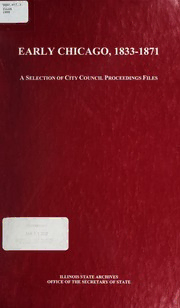
Early Chicago, 1833-1871 : a selection of City Council proceedings files : teacher's manual PDF
Preview Early Chicago, 1833-1871 : a selection of City Council proceedings files : teacher's manual
TEXT.977.3 ILLSA 1999 EARLY CHICAGO, 1833-1871 A Selection of City Council Proceedings Files ILLINOIS STATE ARCHIVES OFFICE OF THE SECRETARY OF STATE TEXT. 977.3 ILLSA 1999 EARLY CHICAGO, 1833-1871 A Selection of City Council Proceedings Files TEACHER’S MANUAL ILLINOIS STATE ARCHIVES OFFICE OF THE SECRETARY OF STATE UNIVEPSITV OF ILLINOIS LIBnR j AT URBAm-CHAMPAIGN education EARLY CHICAGO, 1833-1871 A Selection of City Council Proceedings Files TEACHER’S MANUAL Robert E. Bailey and Elaine Shemoney Evans ILLINOIS STATE ARCHIVES OFFICE OF THE SECRETARY OF STATE SPRINGFIELD 1999 Printed by authority of the State of Illinois (1022698 1.5m 10/99) First Printing 1986 Third Printing 1999 ( ) . 77 CONTENTS Introduction.1 Objectives.2 Use of Documents.3 Historical Background.4 Suggestions for Further Reading.10 List of Documents.11 Documents 1-50.15 B r r.^.. Digitized by the Internet Archive in 2018 with funding from University of Illinois Urbana-Champaign Alternates https://archive.org/details/earlychicago183300bail INTRODUCTION The use of local history to enhance the study of American history in the classroom has received considerable attention for the past several years. Students and teachers alike have often considered the subject of American history to be dry and of little relevance to their place in time. This has been true despite the fact that one of the chief purposes of the discipline of history is to provide one with a sense of continuity and perspective. The fifty document facsimiles provided in this study packet are intended to provide intimate glimpses of life in Chicago over the period 1833-1871. Each forms a picture of a particular circumstance at a particular time. And each picture presents provoking questions. All of the circumstances described by these documents occurred in Chicago and should be of interest to those who now live there as well as those whose lives are largely affected by what happens there. Early Chicago, 1833-1871 is the second publication of its kind issued by the Illinois State Archives.^ Published in 1982, Windows to the Past, 1818-1880 by Roy C. Tumbaugh, Jr., with Robert E. Bailey, is a study packet of local history resources drawn from downstate county level records and focuses on the rural development of the state. The format olEarly Chicago closely resembles that of Windows and it can be used in conjunction with it. Both can be integrated into the regular instruction of American history. Early Chicago consists of an instructor’s manual and fifty photographic reproductions of documents from the files of the Chicago City Council from the date Chicago was incorporated as a town to the Great Fire of 1871. In addition to this introduction, the instructor’s manual outlines the objectives of the study packet, discusses the nature of the documents, gives a brief historical background for the period considered, offers suggestions for further reading, and provides a chronological list of the documents themselves. Following this section a verbatim typed transcription, preserving all spelling ^ This packet, Early Chicago, was partially funded by a grant from the National Historical Publications and Records Commission. 1 errors, of each document is presented along with an explanation of the document, suggested points to consider, and references to related documents in the packet. Most of the facsimile reproductions are the same size as the original documents. The exceptions are documents 25, 26, 41, 45, and 46, all of which were reduced in order to fit them to the 8 1/2 x 14 inch legal size format. On the reverse side of the facsimile appears a verbatim typed transcription of the document as well as an indication of its assigned number, its title, and its date. OBJECTIVES The primary objective of this study packet is to introduce students to local history in a meaningful manner and thereby increase interest in history in general. Taken together, the fifty document reproductions offer a kaleidoscopic picture of Chicago history for the years 1833-1871. Individual documents describe very real historical occurrences, but each leaves unanswered questions which can be pursued by studying related documents in the packet, Chicago history in particular, and American history in general. Subordinate objectives include teaching students how to read historical documents and exposing them to historical reasoning. Besides understanding the texts of documents, students should learn how to identify significant information. Such information will enable them to make specific statements about particular circumstances at particular times. By themselves particular events will have little significance. By studying additional sources broader images can be produced and generalized statements can be made based on previously isolated events. This process is designed to give meaning to historical interpretation and to broaden textbook narratives of consensus history. Local history offers an excellent opportunity to make the study of history in general more real and meaningful. A focus on a specific locality with which students associate will heighten their interest. It also offers them a sense of how the community has evolved over time and thus gives historical perspective. But students of local history soon realize that the history of a locality cannot be treated as a separate entity because regional, national, and world events were of constant influence. It is hoped that this packet will not only supplement the study of American history but also invigorate it. As well as providing information, primary source documents afford the opportunity to 2
